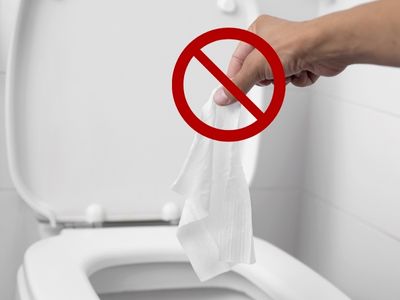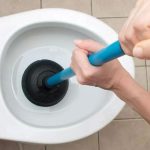
Keep the Toilet From Getting Clogged
A clogged toilet is one of those issues that every homeowner dreads. It’s inconvenient, it’s frustrating, and it can be downright gross to deal with. But it does happen from time to time. Even today’s toilets, designed to be as clog-proof as possible, can still get backed up in certain circumstances.
Fortunately, preventing clogged toilets is easier than most people think. After all, there are only so many things that can cause a clog, and they’re avoidable. So this article will explain how to prevent clogged toilets with three simple tips that every homeowner can start using immediately!
Limit What Gets Flushed
 Toilet clog prevention starts with knowing what can and cannot be flushed. Many toilet clogs result from inappropriate materials being flushed down the toilet. Paper towels, napkins, facial tissues, feminine hygiene products, baby wipes, diapers, cotton balls, makeup removing wipes, dental floss, bandages, medication, and hair are some commonly-flushed items that frequently cause clogs, interfere with the work of waste treatment facilities, and harm the environment. These items should never be flushed.
Toilet clog prevention starts with knowing what can and cannot be flushed. Many toilet clogs result from inappropriate materials being flushed down the toilet. Paper towels, napkins, facial tissues, feminine hygiene products, baby wipes, diapers, cotton balls, makeup removing wipes, dental floss, bandages, medication, and hair are some commonly-flushed items that frequently cause clogs, interfere with the work of waste treatment facilities, and harm the environment. These items should never be flushed.
In short, the only thing people should ever flush down the toilet (aside from human waste) is toilet paper. Even the sanitary wipes marketed as “flushable” should not be flushed. They do not break down the way toilet paper is designed, so even if they don’t cause an immediate toilet clog, they can wind up causing problems in the sewer line later on.
Avoid Flushing Too Much Toilet Paper At Once
 Even though toilet paper is safe to flush because it disintegrates in water, it can still cause clogs if too much is flushed at once. The force of the flush may send a large clump of toilet paper out of the toilet itself. Still, the cluster may become lodged in another part of the drainage system - particularly if there’s already a buildup of debris or general muck in the drain pipe.
Even though toilet paper is safe to flush because it disintegrates in water, it can still cause clogs if too much is flushed at once. The force of the flush may send a large clump of toilet paper out of the toilet itself. Still, the cluster may become lodged in another part of the drainage system - particularly if there’s already a buildup of debris or general muck in the drain pipe.
To prevent this type of clog, homeowners can simply try to use less toilet paper or flush multiple times to reduce the amount of toilet paper flushed at one time. This may seem inconvenient initially, but it goes a long way toward preventing clogs!
Prevent Clogs In the Sewer Line
If homeowners have to unclog toilets throughout the home regularly, the issue might be with the sewer line rather than the toilets themselves. The home’s main sewer line is what carries wastewater from all of the home’s drains into the municipal sewer system. Although it has a wider diameter than the home’s drainage pipes, the sewer line often becomes clogged, affecting every drain in the house.
Most sewer line clogs are caused by the gradual buildup of debris and other materials put down the drains. Grease is the most common culprit since it solidifies and sticks to pipe walls once it cools, then traps other debris that flows into the sewer line. Homeowners can help prevent a sewer line clog by being careful about what they put down the drains. Things like hair, grease, oil, coffee grounds, vegetables, eggshells, and cheese should all be put in the trash rather than down the drain.
It’s also a good idea to schedule periodic drain cleaning to remove buildup and blockages. Professional plumbers use specialized tools like video inspection equipment and hydro jetting machines to identify and fix sewer line clogs safely and without causing further damage.
About Shamrock Plumbing and Drain Cleaning Inc.
Shamrock Plumbing and Drain Cleaning Inc. has nearly two decades of experience serving the Orlando, FL community and the surrounding areas. They offer 24/7 emergency response, no overtime charges, and free estimates on select services. Call them today for plumbing services in Orlando, FL.
Distribution Links +
- htv10.tv
- wicz.com
- rfdtv.com
- snntv.com
- central.newschannelnebraska.com
- metro.newschannelnebraska.com
- midplains.newschannelnebraska.com
- northeast.newschannelnebraska.com
- plattevalley.newschannelnebraska.com
- panhandle.newschannelnebraska.com
- wpgxfox28.com
- lifestyle.mykmlk.com
- wtnzfox43.com
- lifestyle.3wzfm.com
- lifestyle.southernsportstoday.com
- lifestyle.thepodcastpark.com
- lifestyle.680thefan.com
- lifestyle.xtra1063.com
- lifestyle.953hlf.com
- lifestyle.rewind1019.com
- lifestyle.us983.com
- lifestyle.countrylegends1059.com
- lifestyle.967wshv.com
- lifestyle.1045thedan.com
- yournewsnet.com
- midwest.yournewsnet.com
- northeast.yournewsnet.com
- southeast.yournewsnet.com
- southwest.yournewsnet.com
- lifestyle.earl983.com
- west.yournewsnet.com
- lifestyle.maverick1023.com
- lifestyle.magic979wtrg.com
- lifestyle.1077lakefm.com
- michigan.yournewsnet.com







